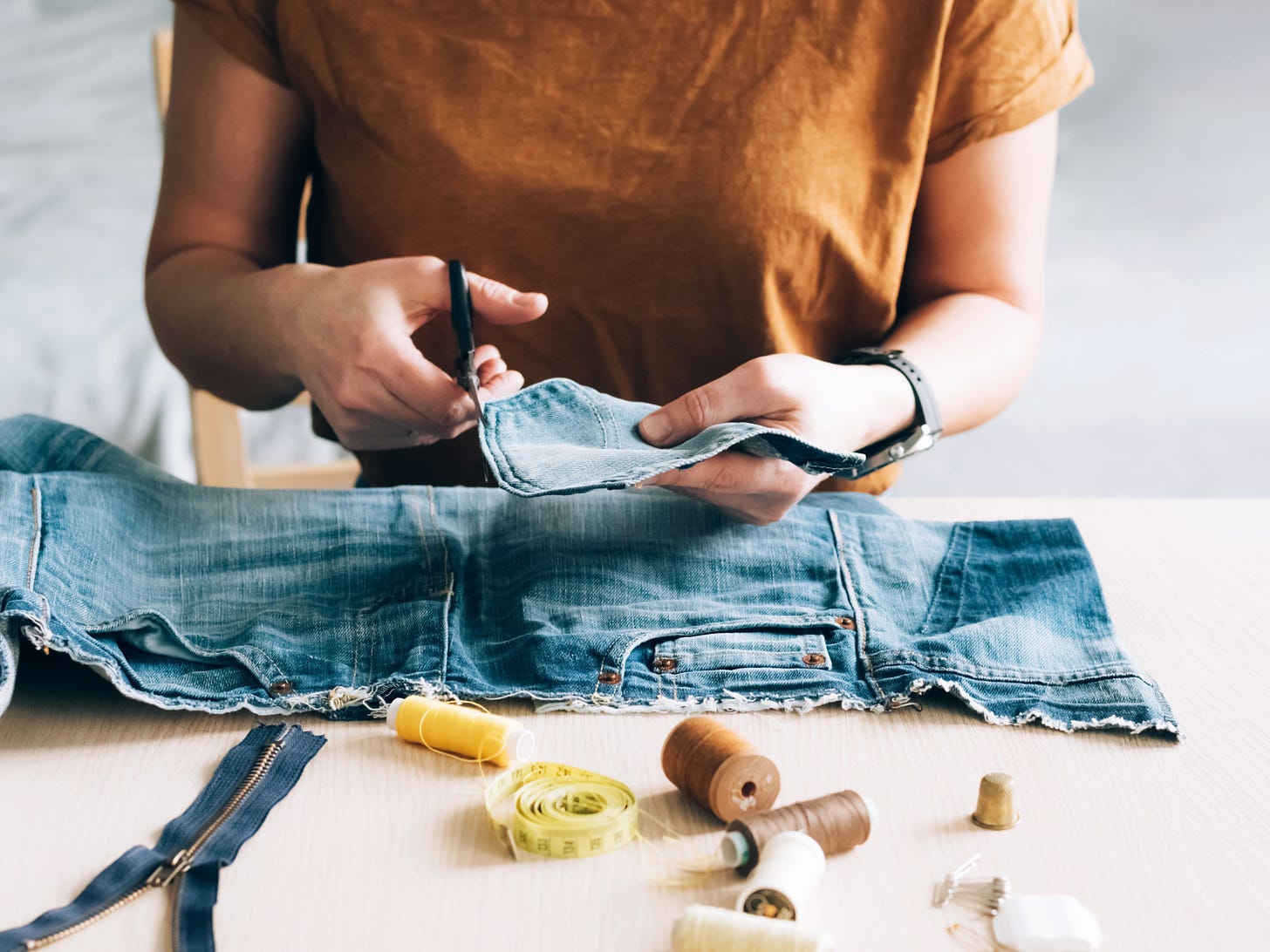Be the change we want to see. Use your local library. Elevated DIY vinegar cleansers. And nixing the fruit flies from your food scrap containers. Back to basics because that’s what we need now.
small actions and sharing with your community
Each week, I end the newsletter with a small action item because action gives us agency, offers a sense of control over our lives, and helps us move forward. It’s not lost on me that our global challenges feel overwhelming and too big to influence with our small actions. However, individuals taking action to form collective momentum is the only way change occurs.
Furthermore, there’s a lot about sustainable living choices that bring communities together. We could use more coalescing around shared humanity and collective interests. Now is a great time to focus on the things we can control and how we can build community, be civically engaged, and connect with others.
Individual action matters because it shapes us and our priorities. It influences our family and friends. And ultimately, collective individual action stimulates systematic change in our cultures, governments, institutions, and businesses.
When the world is heavy, and our challenges are significant (climate change, political calamity, war, poverty, etc.…), it’s easy to wonder if our small actions make a difference. The answer is a definitive yes. It’s the best way we can make a difference!
You don’t need a permission slip, practice, or an expectation of perfection. We each need to do our part to make the world a brighter, cleaner, healthier place, step by step. Our actions add up to a groundswell of collective forward progress.
Here are 25 ways to make more sustainable living choices, many of which you can share or collaborate with others.
25 easy ways to get started with sustainable living
Pick one or two or three that feel accessible, manageable, and maybe even exciting to you. Encourage a friend or family member to try one of these with you. We might be surprised by how small shifts change how we view the world and the people around us.
Join a Buy Nothing group | Buy Nothing groups share their resources and abundance in hyperlocal gifting groups. It’s an excellent way to pass on things you no longer need, ask for things you need that your neighbors might have, and build community. I’ve been surprised by the level of connection the groups generate that’s more than transactional around excess stuff. Here is more information about Buy Nothing groups and how to get started.
Sign up for a library card | Your library offers more than books. Stop by to sign up for a library card; you can use many of their resources remotely. Libraries are an essential part of strong communities. Here are five ways to support your local library and why it matters. Show your libraries and librarians some love!
Use what you already have (containers, jars, linens, etc…) and share with others | Before buying new “sustainable” items, look around and use what you already have. Clean and reuse glass jars instead of buying new mason jars for storage—plastic yogurt or sour cream containers with lids store leftovers as well as fancy silver tiffins. The most sustainable things you can use are the ones you already have. If you have extras, share them with others. I give extra glass jars to a local flower farmer, who uses them for vases for her customers. My neighbors pass along extra egg cartons I bring to our food pantry. These little interactions reduce waste and, more importantly, build community and connection.
BYO grocery bags | I know it’s easy to forget to bring bags to the grocery store sometimes, so don’t expect perfection. I’ve been bringing my bags for years and forget or stop by the store on a whim while I’m out occasionally. Just do your best and bring bags as often as you can remember. Aside from the “remembering part,” the hurdles of this habit puzzle me. Reusable bags are easier to carry, hold more items, and work better. They make sense!
BYO water bottles | For the love of the planet, please stop buying bottled water. Sure, there’s a time and a place, but reusable water bottles are much better! They keep water colder for longer. They don’t sweat. It’s less expensive. They’re just better. Save your hard-earned money and spend it on something other than a crap ton of plastic bottles filled with something you can get for free. A reusable water might make a great gift for that friend who is reluctant to invest in their own.
Opt for time-of-use energy rates | Time-of-use energy rates apply different rates to your electricity based on the time you use it. Find out if your local utility offers time-of-use energy and see if they make sense for you. I’ve done a deep dive on TOU energy rates, how they work, and why they are better for the planet and likely your budget. We use time-of-use energy rates, and I wax poetic about them to many friends and family. Most people haven’t heard of them. They aren’t perfect for everyone, but it’s an effortless way to share eco-friendly education and have a climate conversation in a way that might help your community save money, too.
Start composting (or help friends get started) | Too gross? Before you write me off, I promise composting isn’t as gross as you think. Consider a pickup service (like your trash but for food scraps) or the Reencle electric composter. Here are several resources to help you get started with a compost pickup service. If you already compost, consider these five ways to help family and friends to compost. It’s another way to discuss the climate crisis in a positive light. And offering to help your neighbors lighten their trash load is a great way to connect regardless of religion, political party, or favorite sports teams.
Use food leftovers consistently and give away what you can eat. Be mindful about managing the food you already spent money on. Before shopping, when planning meals, or while indulgently searching the fridge for something to eat, focus on the leftovers first and use them. This will save you money and reduce the amount of food waste in the trash. If you can’t eat it all before it spoils, share your excess with a neighbor or friend. No neighbor will be angry when they get the text, “I have a few extra apples I won’t eat before I leave for vacation in a few days. Can I leave them on your doorstep?”
Learn to repair and mend (clothes, tools, gadgets, etc…) | Whether you DIY your fixes or hire someone to do it for you, mend and repair what you already own if it still has life. Our culture prioritizes quick fixes and tossing items to replace with new ones, even when we can do minor repairs to fix and renew things. What a waste of resources and money. If you have strong mending or sewing skills, you might even consider a little side hustle like this one to help others in your community extend the lives of their clothes.
Shop secondhand | The stigma around secondhand is quickly fading, especially as younger people embrace the benefits of thrifting and resale. If thrift shops feel overwhelming, start with consignment boutiques, curated brick-and-mortar resale shops, or online sites with extensive filters like thredUP and Kidizen. Here are some tips for scoring sweet finds on thredUP. And this brand is my favorite online secondhand marketplace for kids’ clothes and gear.
check out the blog for more ideas
I shared 15 more ideas on the blog for ways to try new eco-friendly habits and let action be the antidote to anxiety and stress. Check them out and choose one or two that feel right for you.
Do you already practice any of these eco-friendly habits? Have you found that they meld into your routines or become second nature?
a few other eco things
Here are some additional small actions from
you can try in the kitchen to lower your plastic use.This is the most popular post on the blog (and I find that fact a little funny). But maybe you can relate. 🍌
Is your countertop compost bin getting a little too “summery”? These tips might help quell the smell if it’s stinky.
I’ve been in cleaning mode lately. Here are some fun and elevated DIY vinegar cleanser recipes beyond your standard lemon scent.
just because
I want to be this kind of parent (from
)We have plans to go back here in a couple of weeks. Do you have any favorite summer activities like this one that are exceptionally wholesome?
weekly mini challenge
action is the antidote to despair
This one is pretty straightforward for this week. Try one of the 25 ideas on the list above that’s new to you. 😊 Let me know how it goes.
Until next time, I hope you’re having the best week available to you. Don’t hesitate to comment or leave questions. I love hearing from you all.
Jen
** These are affiliate links. They have no impact on your purchase. Thanks for supporting the newsletter!
💛 Do you enjoy this space? I’d love for you to share it with a friend and/or hit the HEART at the top or bottom of this newsletter. It helps more people find Sage Neighbor (and totally makes my day). TIA 💛
Jen Panaro is a self-proclaimed composting nerd and advocate for sustainable living for modern families. Through her writing, workshops, and podcast guesting, she helps others find ways to incorporate sustainability into their everyday lives more easily while appreciating the joy along the journey.
When she’s not writing and creating, she’s a serial library book borrower, a messy gardener, a composting tinkerer. She’s a wife and mom of two boys and spends a lot of time in hockey rinks and other sporting venues watching her boys tear it up for their teams.





Thanks for the shout-out! Glad you enjoyed the post.